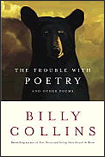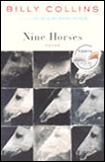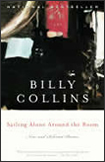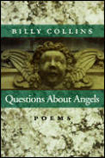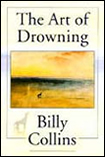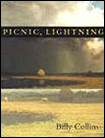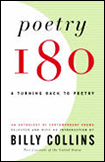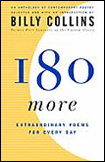Billy Collins
posted Jan 9, 2006
Billy Collins is a leading figure in the world of letters, an advocate who has brought the joys of poetry to millions, and a poet whose own work is read by millions more. When we got the chance to interview the onetime Poet Laureate, we gladly seized it—and not just to ask his views on his craft, and find out about his new collection, but also to find out what makes him gag.
| * * |
You once said that you have a “rather intuitive way of putting a book together.” Can you tell us anything about the intuition that led you to start your new collection with a poem that asks: "I wonder how you are going to feel when you find out that I wrote this poem instead of you…"?
Each of my books begins with a poem that addresses the reader directly. It is my way of acknowledging the presence of the reader, a kind of courtesy. I feel that the reader is a part of the exchange of literature despite post-modern skepticism about the very existence of author and reader. I read too many poems that ignore me. Those are the poems I don’t bother finishing, so I should thank the poets for letting me get on with other things like washing the car. I got, that is, stole the idea for that first poem from Borges. He apologizes to the reader in the introduction to his own poems for having written the poems before the reader had a chance to—which is taking reader courtesy to a subversive, comic extreme.
A line from "The Student" reads: "My poetry instruction book, which I bought at an outdoor stall along the river, contains many rules about what to avoid and what to follow." Do you abide by rules when you write? Which ones do you pass along to your students?
My writing is guided by many rules. I am not consciously following many of them just as when you drive a car you are not thinking about the rules of the road. You just naturally pass on the left and stop at red lights. I write in sentences. That’s one rule. I don’t use contractions. I find them inelegant. Many rules are simply the same as the ones I would follow in prose. I give students a list of words they are not allowed to use. Cicada is one. Vortex is another. Now there’s a book title for you: A Vortex of Cicadas.
You dedicate The Trouble With Poetry to your students and teachers. Who would you name as some of your biggest creative influences?
That dedication probably sounds a bit sappy, but I recently retired from a rather long career of teaching at one college so I found myself looking back on that. I started writing poems as a teenage—a broken-hearted, misunderstood one—and some teachers along the way encouraged me to write. The teachers who truly inspired me were the ones that discouraged me by dismissing my poems as immature and frivolous. I studying at a Jesuit college and self-expression was not encouraged. I think it was thought of as a form of the sin of pride. I have forgotten whatever words of encouragement I received, but I will never forget teachers who refused to take me seriously. I have keen taste for revenge.
Another question about influence: What would you most like young poets to take from your work?
They are free to take what they want. We are all thieves. But like the pickpocket victim at the state fair, I probably will never feel the difference.
We have to ask: what is the trouble with poetry? That it "encourages the writing of more poetry" or that it stirs things up and makes "trouble?"
One trouble with poetry, now that you have gotten me started, is that many poets feel they don’t need to know anything before they begin. They wouldn’t be so foolish as to pick up a bassoon and just start blowing into it, but they think all you need to write a poem is a pencil and a piece of paper, oh, and some emotions, feelings that must be shared with strangers. The fact is you do have to know something. You have to have read thousands and thousands of lines of good poetry.
You have a straightforward way of communicating in your poems that has been characterized as "plain spoken." Do you strive to write this way, or does your poetic voice come naturally?
When I was a young poet, like many, I wrote in very complex, attention-getting language. You begin by showing off because part of the reason you are writing is that you are intoxicated with words. Then if you grow up a bit, you simplify. Just as jazz pianists leave off the 5th in a 7th chord, you learn to leave off the adjective and let the noun speak for itself, unchaperoned. I want to write clean, aerodynamic lines.
During the time you served as Poet Laureate, your Poetry 180 project received a good deal of attention and acclaim. A few years on, what impact do you think it had?
The Poetry 180 program has succeeded beyond my wildest dreams. The website is still up and running; the two anthologies are selling well—over 50,000 of the first one now in print—but best of all is the steady anecdotal reports I get from high school teachers all over the country who tell me that Poetry 180 provided a way to get students interested who would not otherwise be.
Your books have broken sales records for poetry and you have wonderful national visibility. In fact, you are probably one of the few poets to have an agent! Some critics (as well as writers) look down upon on commercial success as somehow sullying the name of literature. Where you fall on this spectrum?
I fall in favor of me breaking sales records for poetry.
You once admitted, “I have no work habits whatsoever,” and that if you did you would “probably write less because you would resent having to stick with a schedule.” Is this still the case? After so many years, is there no specific time or place where do you do the most writing? Have you developed any writing rituals?
As Max Beerbohm once said “The ant sets an example for us all, but it is not a good one.”
In a recent Slate essay, you wondered why so few people now read E.E. Cummings, whose poetry was popular and acclaimed when he was alive. When you write, do you think about how, and if, your work will be read generations after you’re gone?
Posterity is one of the many things I do not think about when I write, or even when I take a shower. I am aware, however, that writing does offer the possibility of extending your voice beyond the grave. To continue to speak after you are dead almost makes up for the grim fact that there will be no mail deliveries to the coffin.
In your piece on Cummings, you write that his “experimentation might be seen to have come alive again” in, among other things, “the coded text-messaging of American teenagers.” Do you think these messages are a kind of poetry? Are there other new communicative forms with poetic potential?
If you say I wrote that, I guess I did, but the habit of using cute abbreviations and typographical faces actually makes me wince or should I say gag?
© 2006 failbetter LLC · all rights reserved





